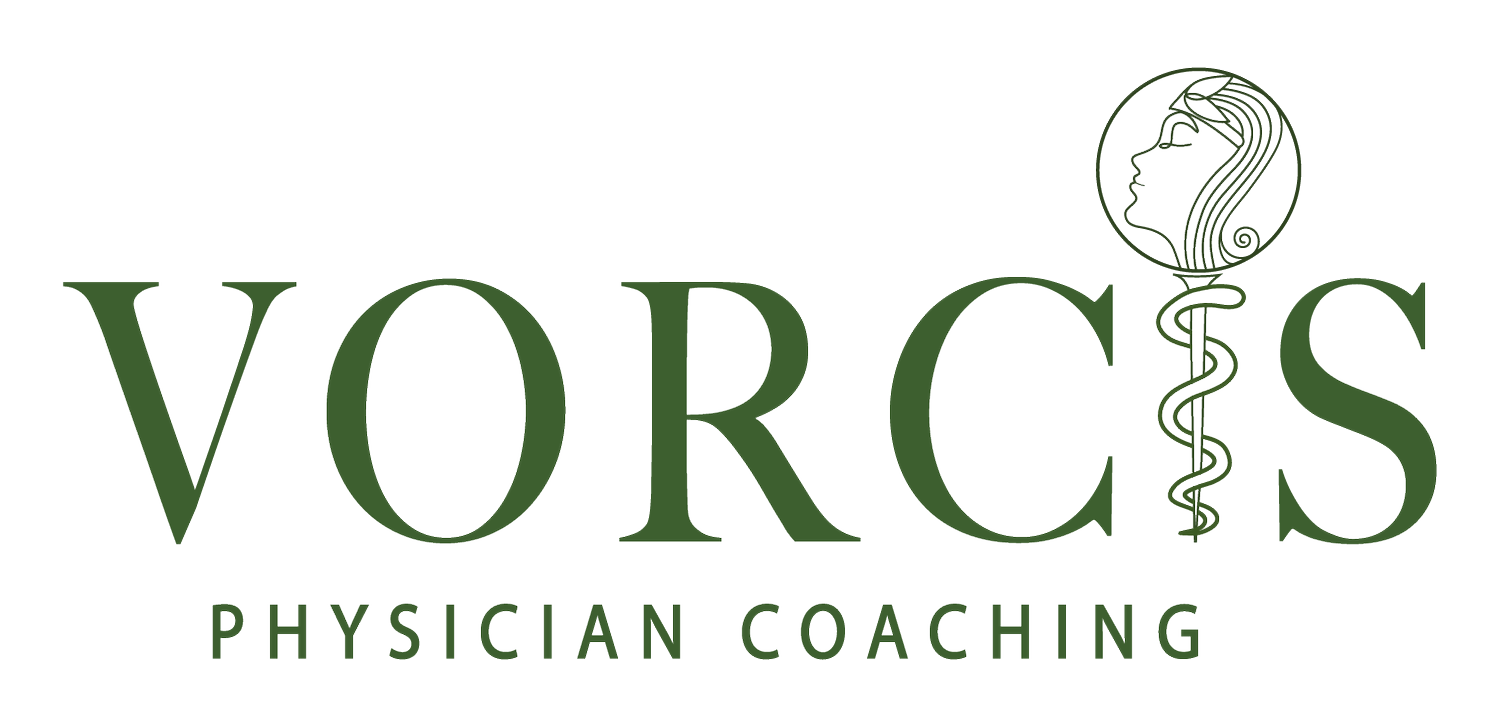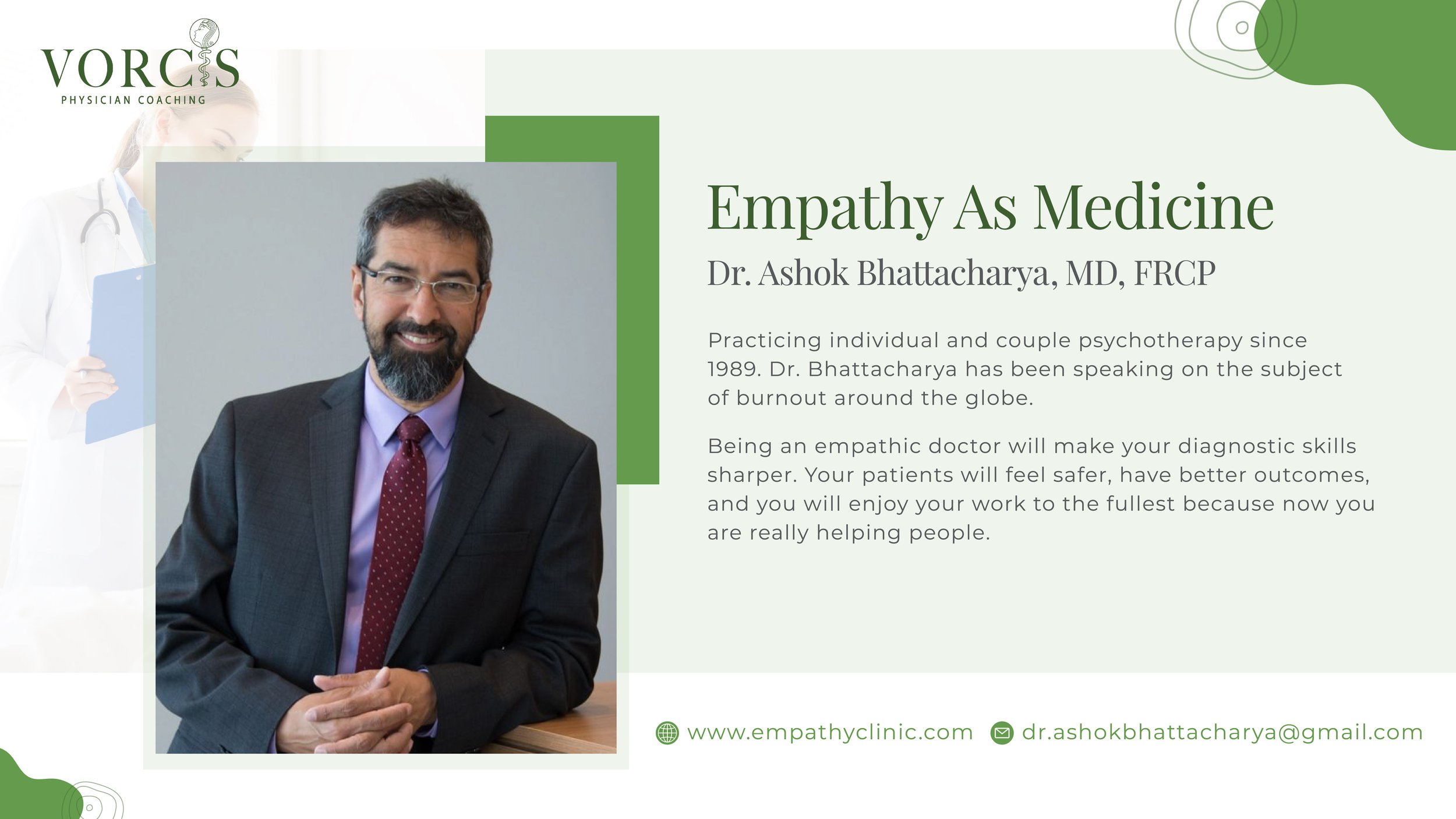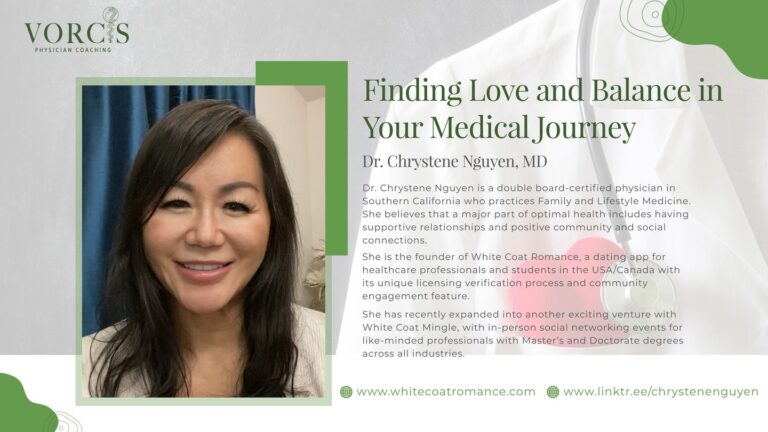EMPATHY IN MEDICINE
Empathy As Medicine
Ashok Bhattacharya MD
Most of us became doctors to ‘help people.’ I did. When I was going through my medical training, I was struggling with family issues—my parents were divorcing, I was playing in a rock band, living hand to mouth, and losing a long-term romantic relationship. I was heart broken, poor, and burning out. I hid inside my secret shame while I studied as much as I could to learn all the diseases and treatments to become a good doctor. I dreaded being ‘found out’ and getting kicked out of med school.
I really only had one interest in medicine: Psychiatry. I did well in medical school, especially everything psychiatric. My fellow students called me Sigmund Freud. As I became more comfortable with my new role as an emerging doctor, I became less comfortable with what I was seeing around me. Everyone seemed stressed: my teachers, other medical students, and the culture of medicine.
It showed up at the bedside where ‘bedside manner’ was decidedly lacking. There I was, standing in a room with the attending, a resident, an intern, and 3 other medical students. The attending was reading from the steel clipboard file, rifling questions to the team, while the terrified patient, who had no name was looking imploringly into the crowd to find kind eyes.
There was no empathy.
It became my mission to change that. I immersed myself in the meager amount of literature there was at that time in the early 1980’s. I did not learn about empathy in medical school or my residency in Psychiatry. I found my psychiatry training difficult as I knew many of the patients I was seeing were misdiagnosed typically with Schizophrenia, Bipolar, or Borderline Personality Disorder. In those days, Post Traumatic Stress Disorder [let alone Complex PTSD] was rarely mentioned. I felt it though…I felt it in my patients. I was trapped. I had to ‘learn from my superiors’ when I knew they were wrong. I kept quiet…I hid.
As soon as I graduated, I set up a private practice outside of academia. I established The Empathy Clinic. I have been a psychiatrist since 1989. I wasn’t told to use empathy as a diagnostic or treatment tool. I was trained to ask for symptoms that, when appropriated aggregated, yielded a DSM [Diagnostic and Statistical Manual published by the American Psychiatric Association] diagnosis that lines up with a pharmacological solution. The DSM does not take an historical narrative approach to symptom gathering. The story is less important than the symptoms. The idea that a ‘person with a psychological condition’ is a ‘PERSON with a psychological condition’ fades away under the bright lights of medical interrogation…we lose the person. We are left with a shoe that fits the foot of a disease, but knows nothing of the soul of the person.
I really only had one interest in medicine: Psychiatry. I did well in medical school, especially everything psychiatric. My fellow students called me Sigmund Freud. As I became more comfortable with my new role as an emerging doctor, I became less comfortable with what I was seeing around me. Everyone seemed stressed: my teachers, other medical students, and the culture of medicine.
It showed up at the bedside where ‘bedside manner’ was decidedly lacking. There I was, standing in a room with the attending, a resident, an intern, and 3 other medical students. The attending was reading from the steel clipboard file, rifling questions to the team, while the terrified patient, who had no name was looking imploringly into the crowd to find kind eyes.
There was no empathy.
It became my mission to change that. I immersed myself in the meager amount of literature there was at that time in the early 1980’s. I did not learn about empathy in medical school or my residency in Psychiatry. I found my psychiatry training difficult as I knew many of the patients I was seeing were misdiagnosed typically with Schizophrenia, Bipolar, or Borderline Personality Disorder. In those days, Post Traumatic Stress Disorder [let alone Complex PTSD] was rarely mentioned. I felt it though…I felt it in my patients. I was trapped. I had to ‘learn from my superiors’ when I knew they were wrong. I kept quiet…I hid.
As soon as I graduated, I set up a private practice outside of academia. I established The Empathy Clinic. I have been a psychiatrist since 1989. I wasn’t told to use empathy as a diagnostic or treatment tool. I was trained to ask for symptoms that, when appropriated aggregated, yielded a DSM [Diagnostic and Statistical Manual published by the American Psychiatric Association] diagnosis that lines up with a pharmacological solution. The DSM does not take an historical narrative approach to symptom gathering. The story is less important than the symptoms. The idea that a ‘person with a psychological condition’ is a ‘PERSON with a psychological condition’ fades away under the bright lights of medical interrogation…we lose the person. We are left with a shoe that fits the foot of a disease, but knows nothing of the soul of the person.
Nomenclature is important and many people are comforted by having a label. Sometime the label someone is holding onto is wrong. I’m not against labels. I’m against wrong labels and someone becoming their label. For example; if you have schizophrenia, you are not a schizophrenic: you are a person with schizophrenia. If you have mumps, you are not a mump!
I realized early on that I’m not really a psychiatrist; I’m a soul catcher. I prescribe psychotropic medications. I make DSM diagnoses. I fill out insurance forms. I write sick notes, but that’s not what I really do. What makes us individual is who we are as a unique being. When we homogenize people into stereotypical categories, individuality is lost. In medicine, every person you see is unique, their illness may fit a stereotype, but it is unique to them. Empathy finds the unique individual in the maze of signs and symptoms.
Empathy is the capacity to appreciate and understand the experience of another from their perspective, not yours. It requires some self-negation; you have to get your perspective, assumptions, and ideas out of the way to appreciate someone else. This is hard, in fact, it’s impossible…but if you try to empathize, it makes a huge positive difference. You know when people just don’t ‘get it,’ and no matter how you explain it to them, they just look at you with glazed eyes and a pursed smile? That’s not empathy. You know you’re being empathized with when you feel someone ‘gets you.’ It’s a feeling of ease, comfort, safety, vulnerability, and healing.
My favorite way to describe empathy is when you speak into a recording device and play yourself back. Others who know you say, “That sounds just like you.” You think, “That doesn’t sound like me!” Why does that happen? Well, when you speak, you hear your voice through air (like everyone else does) and you hear your voice in your head. Go ahead: put your fingers in your ears. You can hear yourself quite clearly, but you will have trouble hearing others. Your voice, as you hear it, is the combination of what you hear in your head and through the air around you. So, empathy is trying to hear how someone’s voice sounds to them, not to you. If someone tells you “I have a headache,” ask how that feels to them.
Empathy is more than sound; it is about feeling and thinking. Virtually every nuance of experience can be empathized with. Empathy can take you away from you and allows you to immerse yourself in otherness. Your perspective is in the way of seeing someone else’s. Did you ever come out of a great movie and have to reorient yourself back your life? For the duration of that engrossing movie, you have left yourself and entered the content of the movie. Imax and other ‘effect’ movie houses—with shaking seats and surround sound—deliberately try to pull you away from your consciousness to merge with the on-screen experience. I create a movie in my mind when someone is telling me their story.
I have one complaint and it’s got to do with footwear. Empathy is not about shoes! I’ve heard many people say, “You should walk in their shoes to know what their life is like.” Now, hear me out. If YOU walk in THEIR shoes, it’s still YOU. Sure, it helps to experience the lives of others, but do you really think someone would fully appreciate you if they walked in your life for a day?
There is so much more to empathy that the soles of our feet. Empathy goes for the experience of our soul. The magic of Empathy is joining souls…not soles!
Empathy notices when to ask, when to listen, when to probe, when to wait, when to comfort, and when to confront. We measure trust, vulnerability, safety, and even love by how much of ourself we can show to someone else. And, when we are trying to empathize with someone else, we are trying to show them that trust and vulnerability. When you look into the eyes of someone looking to you for medical help…see them, hear them. They will tell you what you need to know if you listen…really listen. Empathy is powerful; it is not a weakness. Empathy turns a doctor into a healer.
Empathy never turns its back.
Empathy shows up.
Empathy doesn’t offer help until it knows what will actually be helpful.
Empathy isn’t afraid.
Empathy is curious but sensitive.
Empathy is careful and patient.
Empathy is good medicine.
Being an empathic doctor will make your diagnostic skills sharper. Your patients will feel safer, have better outcomes, and you will enjoy your work to the fullest…because now you are really helping people.
Biography
Dr. Bhattacharya is a psychiatrist in private practice for over 37 years. He is the founder of THE EMPATHY CLINIC. The clinic uses empathy to diagnose, and treat a variety of mental health disorders in individuals and couples. The clinic’s emphasis is on empathy, balance, integration of the spirit and soul, and the pursuit of optimal wellness. He also specializes in the treatment of Post Traumatic Stress Disorder.
Dr. Bhattacharya has presented at conferences around the world on the topics of Empathy and Burnout in physicians.
Dr. Bhattacharya is married, has three adult children and 2 grandchildren. He is a musician, author, artist, and works out six days a week.
Publications:
Cake A Guide to Reciprocal Empathy or Couples (2006)
Deep Fried Nerves (2016) A story of physician burnout
Email: dr.ashokbhattacharya@gmail.com
Website: https://www.empathyclinic.com/
LinkedIn: https://www.linkedin.com/in/ashok-bhattacharya-687a6211/
YouTube: https://www.youtube.com/channel/UCPRzM30XZ8uscgGEx1wnEtQ





Wow that was odd. I just wrote an extremely long comment but after I clicked submit my comment didn’t show up. Grrrr well I’m not writing all that over again. Anyway, just wanted to say superb blog! eddebcggeace
Hi Nicole, Thank you! My apologies, I only realized there was a comment today because I am getting a lot of spam comments. I appreciate you reading and sharing your thoughts!